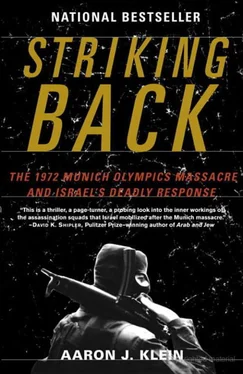On August 23, the chief security officer of the Israeli embassy in Bonn arrived in Munich to inspect the security arrangements—of the Israeli television crews. He met with Lalkin and the head of the Israeli Olympic Committee about “routine security matters,” according to the Kopel Report. Lalkin’s premonition—that his team was in danger—was stronger than ever. He requested a sidearm. The security officer refused.
GERMANY, COLOGNE AIRPORT
WEDNESDAY, AUGUST 23, 1972
A middle-aged couple waited for their four pieces of luggage to arrive. The man, dressed in a well-tailored suit, hoisted the bags onto two carts. They joined the flow of people walking toward the customs line and the exit beyond.
The Palestinian man worked as a saya’an (a Hebrew security term meaning “helper”—an uninformed, ideologically motivated accomplice) for Fatah and its Black September wing in Europe. The “wife,” another saya’an, joined him to lend legitimacy to their cover. The Fatah planners knew that an Arab man, traveling alone, to a city hosting the Olympics, with four bulging suitcases in tow, might raise the suspicions of even the most soporific customs official, putting the entire mission at risk.
The couple had almost made it through customs when an officer beckoned them aside. The couple pressed together and nervously made their way to the inspection platform. They presented North African passports and were asked to open their identical bags. The husband refused. He began to yell and scream. He was a businessman, not a criminal. He had never been so thoroughly embarrassed in all his travels throughout Europe. Why should he be treated this way? The bored customs officers looked on, eyes half-closed. They had seen this act before, and they knew how it ended—the traveler opened his bags for inspection, end of story. Those who yelled the loudest were often the guiltiest. They had seen plenty of drugs and gold cross their path.
After yelling for several minutes, the Palestinian lowered his voice and asked the customs officer which bag he should open. The officer picked one. After wiping the sweat from his brow and fiddling for his keys, the man opened the suitcase. The release of the locks popped the lid. Lingerie, in many colors and styles, swamped the inspection desk. The officer motioned to the man: close your case and carry on. He didn’t ask the couple to open their other three pieces of luggage. Eight AK-47s, dozens of magazines loaded with 7.62mm bullets, and ten grenades slid by undetected on the wobbly wheels of a trolley.
The couple left the terminal, rented a roomy car, and drove the 280 miles to Munich. They had no idea what they were transporting or why. They were couriers. Now and again they were told to carry suitcases, letters, and packages. They never asked questions, and had never been caught.
On arriving in Munich, they followed their instructions to the letter. The couple placed their suitcases in four different lockers in the Munich central railway station and handed the keys over to the concierge of a small, nearby hotel. Hours later, a Black September commander came by the front desk and picked up his package.
The senior members of Fatah, working under the name Black September, sighed in collective relief when they learned that the baggage had safely arrived. The operation was on track, progressing exactly as planned. They had thirteen more days. They’d act on the tenth day of the Olympics, in the early morning hours of Tuesday, September 5, 1972.
• • •
Black September was unveiled in the fall of 1971. It was born on the heels of a massacre. In mid-September 1970, King Hussein, the ruler of Jordan, had his back against the wall. Palestinians, who by that time represented nearly 60 percent of the Jordanian population, were on the brink of toppling his regime. Bloody battles erupted in the streets of the capital, Amman. Thousands of Palestinians were slaughtered by Hussein’s army. The surviving activists, overpowered, fled for their lives. Thousands entered Syria and from there continued on to the neighborhoods surrounding the Lebanese capital of Beirut. Once there, they began to rebuild their terrorist infrastructure.
Black September’s primary mission was to avenge the killings committed by Hussein’s Hashemite regime. Its first undertaking was the assassination of Wasfi Al-Tell, the Jordanian prime minister—a man they saw as a sworn enemy of the Palestinians. Al-Tell was gunned down in the Cairo Sheraton on November 27, 1971. One of his killers bent down and, to the astonishment of eyewitnesses, lapped up Al-Tell’s blood.
The murder of the prime minister was the first of a slew of revenge killings. Black September operatives, acting in Europe, detonated bombs in the Jordanian embassy in Geneva, lobbed Molotov cocktails at the embassy in Paris, and fired a machine gun at the ambassador to England.
Black September was different from other Palestinian terror organizations: it had no offices, no addresses, no official leaders, and no spokespersons. Fatah members embraced the secrecy surrounding Black September, feeding its aura of mystery, its martial might and propaganda potential. But Black September was not as autonomous as it seemed—Salah Khalaf, widely known as Abu-Iyad, deputy of Arafat and one of the commanders of the Fatah, was Black September’s unofficial leader.
Black September’s goals were far more than simply revenge. Arafat and other Fatah leaders wanted to demonstrate their power and display—in no uncertain terms—their international prominence after their defeat at the hands of the Jordanians. Fatah leaders also made a strategic decision to become involved in international terrorism, particularly in Europe, where left-wing factions of the Palestinian resistance were hijacking planes and pulling off many different high-profile terrorist stunts, their popularity growing across the Middle East and indeed around the world as a result.
Abu-Iyad never acknowledged his leadership of Black September; he, like Arafat, disavowed any connection to the group. Arafat, when asked about his relationship to Black September at the time, offered this: “We don’t know anything about this organization nor are we involved in any of its activities, but we do understand the mentality of young people who are willing to die for the life of Palestine.” The technical arrangement whereby Fatah would quietly take the credit for, and publicly disavow any connection to, terror attacks, suited Arafat: it allowed him to build a facade of respectability as head of an organization with clean hands and legitimate, nationalistic aspirations—while approving sensationalistic attacks behind the scenes.
Black September disseminated information on a need-to-know basis. Beyond Abu-Iyad, few were allowed to see the complete picture. Its structure consisted of two inner circles. The first was comprised of Abu-Iyad’s disciples. Mohammed Oudeh, an operations officer known as Abu-Daoud, was the most senior. He was the architect of the Munich operation. Fakhri Al-Omri, the operations officer and a rising star in Fatah, served as Abu-Iyad’s confidant and right-hand man. Al-Omri was cunning, calm under duress, a gifted tactician, and a skilled organizer. It was he who picked up the keys and collected the weapons from the lockers in Munich, and he followed the operation through all its stages. The other men in this innermost circle were Amin Al-Hindi, who later ran an intelligence wing in the Palestinian Authority, and Atef Bseiso, later Fatah’s liaison with European intelligence organizations.
A second circle consisted of accomplices who, like the couple that smuggled in the four suitcases, knew nothing beyond their personal assignments. They handled forged passports, rented cars and apartments, bought plane tickets, and concealed documents. Many were Palestinians living in Europe. Some were university students, others were part of the Palestinian Diaspora who had settled comfortably in Europe, perhaps married locally, while remaining ardent in their desire to help liberate their stolen homeland from the Zionist oppressor. Close to one hundred people of this sort were in Black September’s employ.
Читать дальше












